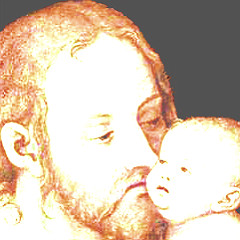
One after another the kids kept coming.
Parents were bringing their children to Jesus for his blessing, and Jesus was happy to comply. The disciples, however, were less accommodating. As the gospels report, “the disciples rebuked them” (e.g., Mark 10.13).
Jesus was not pleased with his followers. Mark tells us that he was indignant.
“Let the children come to me,” he said, “do not hinder them; for to such belongs the kingdom of God. Truly, I say to you, whoever does not receive the kingdom of God like a child shall not enter it” (10.14-15).
Great. So we need to be like children. But what does that mean?
A point of comparison
All three synoptic gospels tell the story, and all three follow it immediately with another event. It’s an event that we often consider separately, but which the evangelists apparently wish us to contemplate together with the statement about accepting the kingdom as children.
From Mark’s gospel:
And as he was setting out on his journey, a man ran up and knelt before him, and asked him, “Good Teacher, what must I do to inherit eternal life?” . . . And Jesus looking upon him loved him, and said to him, “You lack one thing; go, sell what you have, and give to the poor, and you will have treasure in heaven; and come, follow me.” At that saying his countenance fell, and he went away sorrowful; for he had great possessions.” (10.17, 21-22)
Hold these stories together. On the one hand, the rich man has many possessions. The children, on the other hand, have nothing. The rich man desires to follow but has reasons to hold back; the children come uninhibited. The rich man is calculating; the children are simple and innocent — “pure from all the passions,” as John Chrysostom put it when commenting on this story.
“The young child is not grieved by what grieves us, like losing money and other such things,” he elaborated. “Nor does he rejoice at what we rejoice at, namely temporal things” (Homilies on the Gospel of Matthew 62.4, paraphrase).
Our sufficiency is Christ
Whereas the rich man is self-sufficient, the child is utterly dependent. He has nothing. He cannot even come to Christ on his own. Others, his parents, do so on his behalf. But Chrysostom helps us to see that the distinction cuts even deeper. The child doesn’t even think about these things. She is free from the handcuffs of self-sufficiency, those bracelets that feel so ennobling, but which hold us fast with anxiety and concerns, because the child has no concept of self-sufficiency.
This is the kind of innocence and simplicity to which we are called — one in which our earthly cares never distract us from following Christ. I’m not there yet, far from it.
Nonetheless, exhorts the gospel, “die to all your possessions and live in [Christ]; depart from the old world of the passions and so enter into the new world of the spirit. Take up your cross and strip yourself of the knowledge of methods and craftiness and so put on the simple knowledge of the truth” (Epistle to Abba Symeon of Caesarea, possibly written by Isaac the Syrian).
As if to drive home this point, after the episode with the children and the exchange with the rich young man, Jesus turned to his disciples and said, “Children, how hard it is to enter the kingdom of God!” (Mark 10.24)
This is the only time in the entire gospel of Mark that Jesus refers to his disciples as children. It’s the only time in all the gospels, save two references in John, that Jesus does so. Mark is making sure we don’t miss the point. By reporting these stories together and concluding with Christ calling his disciples “Children,” he’s reminding the faithful of our true identity.
We have nothing. Our sufficiency is Christ, not our possessions, nor our calculations.
Empowered by Christ
The disciples were frankly a bit dismayed by all of this. “Who can be saved?” they asked.
Jesus did not exactly answer their question, but he did point to the solution: “With men it is impossible, but not with God; for all things are possible with God” (Mark 10.27). Indeed, John tells us that “to all who received him, who believed in his name, [Christ] gave power to become children of God. . .” (John 1.12).
Christ is the answer. As we pursue him like children, he empowers us all the more. Which brings up an important question: What concerns are we allowing to impede our journey to the kingdom?
















